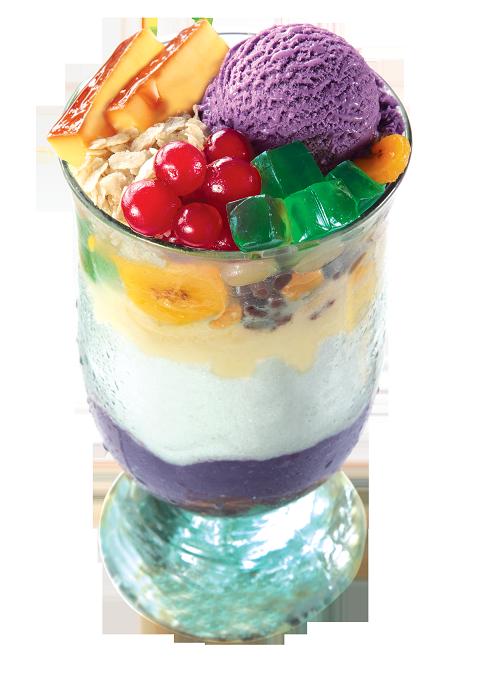Welcome to DU!
The truly grassroots left-of-center political community where regular people, not algorithms, drive the discussions and set the standards.
Join the community:
Create a free account
Support DU (and get rid of ads!):
Become a Star Member
Latest Breaking News
Editorials & Other Articles
General Discussion
The DU Lounge
All Forums
Issue Forums
Culture Forums
Alliance Forums
Region Forums
Support Forums
Help & Search
Asian Group
Related: About this forumEVERYTHING you wanted to know about HALO HALO....

While its Filipino name means 'mix-mix' in English, this favourite shaved ice dessert was introduced to the Filipinos by the Japanese settlers. According to historians, the Japanese had sweet desserts called 'Mitsumame' or 'mongo con hielo' and 'kakigori' which closely resemble the Filipinos' Halo-halo.
Halo-Halo: Favourite Dessert of The Philippines - Culture Trip
Wikapedia:
Halo-halo, correctly spelled haluhalo, Tagalog for "mixed" (the more common spelling instead literally equating to "mix-mix" ) is a popular cold dessert in the Philippines made up of crushed ice, evaporated milk or coconut milk, and various ingredients including ube jam (ube halaya), sweetened kidney or garbanzo beans, coconut strips, sago, gulaman (agar), pinipig, boiled taro or soft yams in cubes, flan, slices or portions of fruit preserves and other root crop preserves. The dessert is topped with a scoop of ube . It is usually prepared in a tall clear glass and served with a long spoon.[1] Halo-halo is considered to be the unofficial national dessert of the Philippines. The term "halo-halo" is supposed to mean "mixed" in English because the dessert is meant to be mixed before being consumed. Despite being strictly grammatically incorrect, this spelling has come to describe any object or situation composed of a similar, colorful combination of ingredients.
5 Facts About Halo-Halo You Didn't Know
Halo-halo. It’s the quintessential Pinoy sweet treat that lets you beat the heat all year round. Nothing tops the combination of crushed ice and layers of sweet beans, tapioca, gulaman, macapuno, ube, and sliced fruit, topped with a hefty scoop of ice cream and a mouthwatering slice of leche flan. You may have grown up with this classic Filipino dessert and merienda, but we’re pretty sure you don’t know everything about it. Here are a few fun facts about halo-halo you probably didn’t know.
It has foreign roots
One might think that the tropical weather inspired the locals to design this cool, colorful treat, but halo-halo actually originates from the Japanese shaved-ice dessert. It was before World War II when the Japanese brought this sweet refreshment to the country, where it was given a Pinoy twist!
It wasn’t always called halo-halo
The Japanese called it “mong-ya” because they used mung beans as one of the ingredients for the shaved ice dessert—which was a novel concept to Filipinos during the Japanese occupation.
There is no "perfect" halo-halo
In fact, halo-halo from different regions in the Philippines look and taste different from each other because of the different combination of fruits and other ingredients endemic to each location! One thing remains, though—it’s always a refreshing delight no matter where you go.
It’s internationally recognized
…and has even been dubbed “oddly beautiful” by popular food critics. Most of the time, our exotic dishes get more attention overseas but halo-halo has been recognized all over the globe for all its icy and delicious glory. An American food magazine even came up with their own version of the tropical treat by throwing in gummy bears and popcorn into the mix.
Filipinos actually celebrate halo-halo
Because what’s not to celebrate about this classic Filipino dessert and merienda? Last March 19, over 450 Mang Inasal stores nationwide participated in the National Halo-Halo Sarap Day wherein customers got to enjoy an all-day Pinoy Halo-Halo promo for only P25 (small) and P45 (large)—letting them save P28 per order. It was an eventful day as local celebrities Angel Locsin and Coco Martin celebrated at the Mang Inasal SM East Ortigas and SM Fairview branches, respectively. It was surely a treat for everyone who came to celebrate halo-halo at Mang Inasal! Don’t worry if you missed out—you can always catch Mang Inasal’s next National Halo-Halo Sarap Day!
https://www.spot.ph/newsfeatures/5-facts-about-halo-halo-you-didn-t-know-adv-con
one last fact!!! ITS YUMMY, YOU HAVE TO TRY IT!!
InfoView thread info, including edit history
TrashPut this thread in your Trash Can (My DU » Trash Can)
BookmarkAdd this thread to your Bookmarks (My DU » Bookmarks)
0 replies, 707 views
ShareGet links to this post and/or share on social media
AlertAlert this post for a rule violation
PowersThere are no powers you can use on this post
EditCannot edit other people's posts
ReplyReply to this post
EditCannot edit other people's posts
Rec (1)
ReplyReply to this post